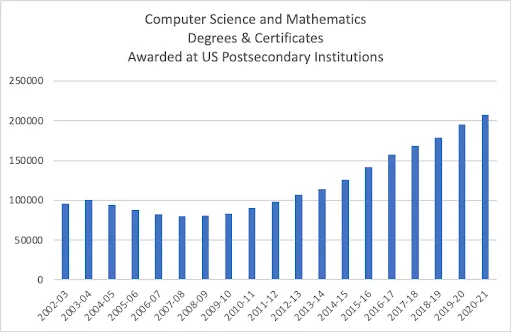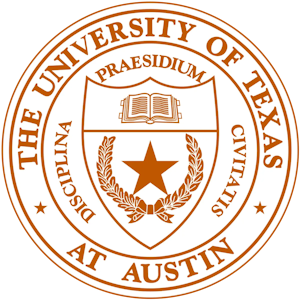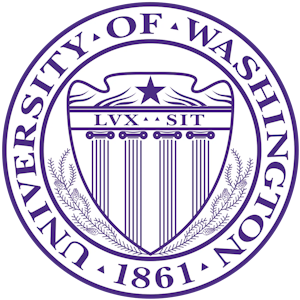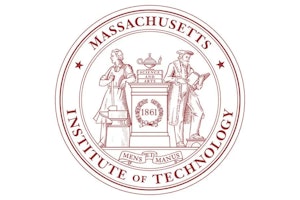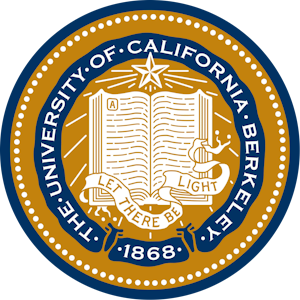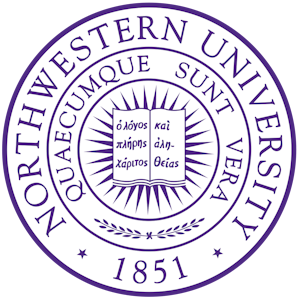This growth should come as no surprise: the US Bureau of Labor Statistics (BLS) estimates the median data scientist in the US earns just over $100,000 annually, more than 2x the annual median wages for the country. In reality, mid- and late-career data scientists at high-performing companies can earn much more. And it’s not like the opportunities are limited. The BLS forecasts a 36% growth in data scientist headcount by 2031, over 7x the growth rate projected for the US labor market as a whole over the same time.
Of course, a booming job market doesn’t mean there isn’t any competition for these roles. On the contrary, for each opening, hiring managers and recruiters receive reams of resumes from candidates eager to play a central role in tomorrow’s data economy. As a result, aspiring data scientists interested in investing in their futures are keen to find and enroll in the best schools for data science. But again, easier said than done: not only are there many schools out there purporting to offer the best data science education, but it’s not exactly clear what is even meant by best. After all, no two students are the same, so while Columbia University might be the best school for one student, Carnegie Mellon University or University of Texas — Austin might be better for another.
With this in mind, we set out in this article to map how you can identify your best schools for data science. After breaking down exactly how a data science bachelor’s degree, master’s degree, or professional certificate can launch you onto your data science career path, we’ll present some of our favorite programs and lay out some factors to take into consideration as you research programs.
Data science career path: what’s the role of education?
Data science is a highly interdisciplinary field, combining computer science, applied mathematics, machine learning, and research science to develop new ways to extract actionable insights from the big data sets produced by corporations, human activity, and the environment daily. This interdisciplinarity means there are various entry points into data science, both in terms of an individual’s educational background and career stage. As you’ll see, the different educational options offered by colleges and universities aren’t just about giving students progressively more advanced training but about providing opportunities for students who have already progressed along other paths to pivot and leverage their existing skills to transition into data science.
Data science bachelor’s degrees
Until recently, students interested in leveraging a bachelor’s degree to pursue a career in data science would major in an adjacent field like computer science, advanced statistics, business, or even information technology, perhaps complementing their course of study with a relevant minor. This remains a viable path for many, especially because it allows the student to retain optionality should they not wish to continue in data science.
However, many universities and colleges are increasingly offering specific data science majors and concentrations. These programs generally furnish students with a baseline understanding of the following areas:
Fundamental and applied mathematics: calculus, statistics, probability, linear algebra
Computer science: Excel, SQL, Python and R programming languages, software engineering, operating systems and systems programming, database systems
Machine learning: machine learning algorithms, predictive analytics, deep learning
Data management: data engineering, data mining, data visualization
Social sciences and humanities, according to individual interest and distribution requirements
In addition to this coursework, many programs recommend or require students to complete an internship or capstone project to gain experience applying what they’ve learned in a real-world setting.
In the US, bachelor’s degrees are generally a four-year commitment, with an average cost of attendance of $102,828 for students paying in-state tuition at a state school and $218,004 for students at a private university. Upon graduating, students who are viable candidates for entry-level data analyst, data scientist, business analyst, and data engineer positions. To move up in the field of data science, however, there is a good chance that a college graduate will eventually need to earn a master’s degree, which we’ll turn to now.
If you’re interested in learning more about data science bachelor’s opportunities, check out the programs listed at the end of this article.
Data science master’s degrees
According to one recent study, over two-thirds of data scientists hold a master’s degree or higher. While not all data scientists will hold their master’s degree in data science specifically, a data science master’s is growing in popularity as the field matures, junior data scientists look to advance their careers, and professionals from different backgrounds are looking to transition into data science.
While many universities frequently offer full-time in-person master’s programs, online data science master’s degrees are increasingly offering students looking to advance or transition their careers the flexibility to continue working and avoid relocating while doing so.
As expected, the curriculum for a data science master’s resembles that of a data science bachelor’s but is more condensed and advanced and generally omits distributional requirements such as courses in the social sciences and the humanities. Master’s students in a data science program can expect to take courses in:
Computer science: advanced data science algorithms, machine learning and deep learning, software engineering
Statistics and linear algebra: advanced data analysis, statistical modeling R or Python, and other applied mathematics
Data science principles: research design, data management (data collection, data mining, data cleansing, database management, etc.), data science ethics
Industry-specific electives such as Big Data in Finance, Sports Performance Analytics, Marketing Analytics, etc.
As with bachelor’s programs, most data science master’s students are expected to complete an internship and a capstone project. According to Education Data Initiative, the current average cost of a master’s of science degree in the US is $59,720. As we explain in our article on master’s in data science salaries, students with an aptitude for mathematics, computer science, and information technology have a high likelihood of seeing a high return on their up-front investment in the degree by working in one of the following high-paying capacities:
If you’re interested in learning more about master’s in data science opportunities, check out our full guides on in-person and online programs.
Data science professional certificates
In addition to traditional two- and four-year degrees, many universities and colleges offer both professional education and executive education certificate programs in data science. Professional education (sometimes “continuing education”) programs, usually offered online, can take the form of a bootcamp — a condensed but comprehensive course of study that provides career services to place graduates in entry-level positions — or a shorter certificate program. In both cases, the goal is to provide training in specific data science skills. University professional education programs are good options for aspiring data scientists who don’t wish to spend the time and money on a traditional degree but would still like to benefit from the education and name recognition a college or university can provide.
Executive education programs, on the other hand, are designed to help managers, executives, and other leadership gain fluency in data science concepts and terminology and better understand how to implement data solutions at their companies, including particular use-cases for their industries and how to hire and lead teams of data scientists effectively. These programs can be completed online or in one or several short residencies.
The best schools for data science
Now that we’ve covered what colleges and universities offer, it’s time to dive into what goes into being one of the “best” schools for data science.
What does it mean to be the best?
With such astronomical salaries on offer, it makes sense that future data scientists would try to put their best foot forward by seeking out the best colleges and universities for their data science degree or professional program. Just a quick Google search will show you a number of sites working to fill this need by ranking data science schools to ease research and decision-making.
While these rankings might help the process along, merely ranking programs collapse some important nuance: identifying the “best” programs presumes that just one kind of student is seeking data science education. In reality, each prospective student has their background, priorities, realities, and needs — so what’s best for one might not be best for all.
Our approach
In light of this fact, our approach to collecting the best schools for data science is slightly different than the norm: we certainly aim to feature stellar programs, but we also strive to prioritize accessibility. Accordingly, we’ve sought to feature a broad swath of programs, all of which are stellar but differ in the following ways:
Reputation
Size
Geographic location
Modality
Focus (e.g., machine learning, data science for social good, industry emphases, etc.)
Price
So, while you’ll find many of the big names you would expect to find on such a list, you’ll also find some great options that, while perhaps not usually top-of-mind, provide quality data science instruction online or at a fraction of the price.

